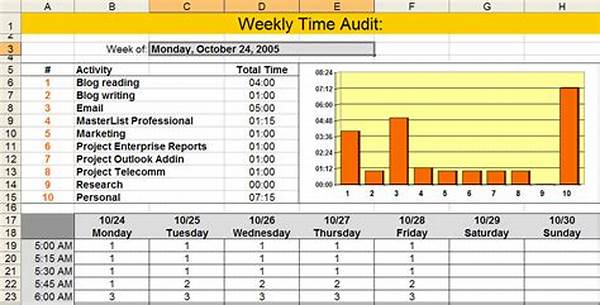In the grand theater of life, time stands as both the star and the stage. Its fleeting nature is something we all grapple with, whether we’re busy executives, creative artists, or stay-at-home parents. Yet, the realization that time, once spent, is irretrievable, places immense value on how we manage it. Welcome to the era where auditing your time weekly is not just a productivity hack—it’s a lifestyle change. Picture this: with every sunrise, you receive exactly 86,400 seconds. Just like dollars in a bank account, the choices you make today affect your future. Do you want to spend these seconds wisely, crafting a narrative of achievement and satisfaction, or let them slip through the cracks of indecision and distraction? This conundrum is not just personal; it’s universally relevant.
Read More : How Students Manage Time With Pomodoro
The concept of auditing time embodies the art of scrutinizing your daily activities and decisions. It is a reflective practice that can unveil inefficiencies, reveal priorities, and refuel your passions. Intriguingly, it’s an exercise that can transform a mundane week into a symphony of productive routines. However, committing to how to audit your time weekly is a feat not without its challenges. You may encounter self-doubt or the occasional resistance to change. Yet, the rewards of persistence are plentiful: a clearer mind, sharper focus, and personal empowerment.
The Power of a Time Audit
Engaging in a weekly time audit empowers you to reclaim your narrative. Imagine sitting down with a cup of coffee at the week’s end, leafing through the chapters of your week. What transpired? What masterpieces were accomplished? In this reflective state, you wield the power to rewrite your future encounters with time. How to audit your time weekly? The process is simple yet profound. Start by recording your daily activities, identify what fuels your passion and what drains your energy. This routine pivots attention back to what truly matters, ensuring that every moment aligns with personal values and objectives.
Navigating through a time audit might evoke an emotional journey. It requires facing the truth about time squandered, but it equally celebrates moments well spent. Imagine the feeling of uncovering hidden hours that lay dormant within your schedule, like treasure waiting to be claimed. When executed effectively, auditing time doesn’t merely manage your days; it revolutionizes your approach to life itself. Isn’t time management worth the investment, knowing that it shapes the life stories we aspire to write? Consider it a personal offering—an invitation to step into a more refined cadence of living.
Building the Habit
The crux of auditing time lies in consistency. Building this habit requires dedication akin to maintaining a cherished relationship. Your interaction with time transforms into a dialogue—an opportunity to negotiate, nurture, and know each other’s patterns more deeply. Week by week, as patterns emerge, they offer insights and dictate strategies for improvement. Diverging from the routine might seem daunting at first, but embracing each tiny triumph redefines the journey. How to audit your time weekly? Begin now. As the curtain closes on this chapter, remember that each tick of the clock is a chance to create, dream, and laugh. Time doesn’t just pass; it performs. So let it bring down the house by being your co-star, your ally, and your guide on the stage of life.
—
How to Start Your Weekly Time Audit Process
1. Identifying Time Wasters and Energy Drainers: Understand what activities consume your time inefficiently.
2. Setting Priorities: Align your weekly activities with personal goals and aspirations.
3. Using Tools and Technologies: Explore apps and methodologies to streamline the process.
4. Reflecting on Past Audits: Use insights from previous audits to make informed decisions.
5. Creating a Reward System: Motivate yourself with personal incentives for achieving weekly time goals.
6. Involving Accountability Partners: Share your progress with peers or mentors for added motivation.
7. Integrating Time Audits into Routine: Make it a habitual practice every week.
8. Balancing Work and Personal Life: Ensure both areas are given adequate attention and energy.
9. Preparing for Unexpected Events: Learn to adjust the audit process in case of unforeseen circumstances.
10. Tracking Long-Term Progress: Document changes over months to assess overall improvement in time usage.
—
Embarking on the journey to effectively auditing your time weekly can be as thrilling as a treasure hunt. Except, in this case, you are unearthing valuable insights about yourself and your habits, rather than gold doubloons. By having a clear strategy, you’re more likely to discover the patterns and rhythms that most benefit your life, encouraging a more harmonious relationship with time.
Why a Weekly Time Audit Matters
Your weekly time audit is akin to creating a snapshot of your week—an honest and raw portrayal of where your energy goes. Statistics show that individuals who conduct regular time audits feel more in control and are better equipped to tackle their to-do lists with vigor. It’s not just about managing time; it’s about mastering it. Reflecting on how you spent your week allows you to acknowledge both your achievements and areas requiring improvement. How to audit your time weekly is more than a task; it’s a recognition of your commitment to personal growth.
In the grand scheme, your weekly time audit shields your priorities against the onslaught of distractions. It is the ally subtly whispering, “Hey, remember what matters?” As weeks turn into months, you’ll find a rhythm that suits your lifestyle, effectively balancing productivity with leisure. When the diligence of time auditing becomes second nature, the reward is a life where you’re no longer running against the clock, but rather conducting your own symphony with it.


